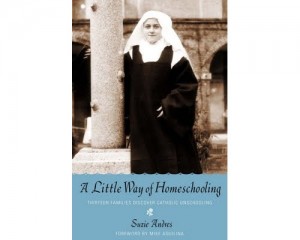 I don’t often reread books. As a book reviewer, I always seem to have more good books in my “to be read” pile than I could ever have time for. Therefore, for me to read a book twice, it really needs to be something extraordinary and helpful to my life. A Little Way of Homeschooling by Suzie Andres definitely falls into that category.
I don’t often reread books. As a book reviewer, I always seem to have more good books in my “to be read” pile than I could ever have time for. Therefore, for me to read a book twice, it really needs to be something extraordinary and helpful to my life. A Little Way of Homeschooling by Suzie Andres definitely falls into that category.
I first had the pleasure of reading this book last August when I was gearing up for the 2011-2012 school year. I knew I had to take a different approach to our homeschooling and this book on Catholic unschooling came along at just the right time to help me make the adjustments our family needed. For the purposes of this book, “unschooling” is defined as “making education hinge on the desire for knowledge, rather than on rewards and punishments . . . it allows the child to learn according to his interests and abilities and makes the desire to know, rather than fear of punishment, the primary motivation for learning.”
On Monday, my two boys and I will begin our fifth year of homeschooling and I recently found myself compelled to once again find refuge and renewed courage in the shared wisdom of those who share their stories within its pages. I am not a true unschooler. I have relaxed quite a bit in five years, but as much as the unschooling lifestyle appeals to me, I can’t let go to that extent. Yet, that is the beauty of A Little Way of Homeschooling – one need not be an unschooler to appreciate and benefit from the encouragement of this book.
Andres, who is a graduate of St. Thomas Aquinas College and who holds an M.A. in Philiosophy from Notre Dame, became known as an expert in Catholic unschooling after writing Homeschooling with Gentleness, in which she chronicled her own journey towards unschooling and explored how a Catholic could unschool and still be in keeping with Church teaching. In A Little Way of Homeschooling, Andres asked other Catholic families to share their experience of unschooling. All of their stories are informative and inspirational. The first nine families profiled are true unschoolers. The remaining four “integrate elements of unschooling with more formal approaches to learning.”
Karen Edmisten, author of After Miscarriage: A Catholic Woman’s Companion to Healing and Hope, falls into that latter category and describes herself as an “Unschooler with a Plan.” She writes:
The beauty of homeschooling is that we get to do what works for us. Sometimes that means a carefully crafted plan. Other times, it means letting go of the plan to see where our days take us. Unschooling doesn’t necessarily mean there’s never a structured lesson, or never anything that looks like school, though it often means that. It doesn’t mean we’ll never touch a textbook or do a worksheet. If those things help, and learning happens, we sometimes do them. What unschooling means to me is that we needn’t adhere to a model of school that doesn’t serve us.
Isn’t it true that most of us get into homeschooling because, for whatever reason, the traditional “model of school” didn’t serve our children well? In educating our children at home, we have the opportunity and responsibility to find a model that does work, or at least works reasonably well, for our individual children.
What I appreciate most about this book is that, unlike many books on homeschooling, it doesn’t present a “perfect” picture of homeschooling. Those types of homeschooling books were very helpful to me when I was starting homeschooling and dreaming of all it could be. Five years in, I find I can’t even read those books anymore because comparing myself to those families makes me want to crawl under the covers and never come out! A Little Way of Homeschooing is a book for those in the homeschooling trenches, sharing the stories of other mothers who have messy homes and children who don’t necessarily wake up in the morning eager to embark on an exciting new day of learning at home.
Andres encourages us to “Trust God and be gentle with ourselves. . . What is learned and achieved is extremely individual to the child – and directed by God. Parents and teachers can assist, but they are not the ones primarily in charge.” That is such an important thing for each of us homeschoolers to remember. I plan to make reading A Little Way of Homeschooling an annual event in my homeschooling life.



